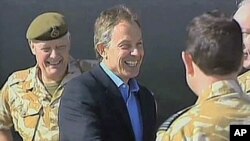Witnesses in the second week of Britain's wide ranging inquiry into the Iraq war have revealed differences between the United States and Britain in the days running up to the war. The head of Britain's military say he was only given authority to plan for the war at a late stage.
Former Prime Minister Tony Blair's top political advisor in 2002 was David Manning. He told the Inquiry panel here in London Friday that Mr. Blair made a decision in the spring of 2002 that Britain would stand by America. "He expected to be with the United States until the end," Manning said. "But this would only be possible if the United Nations were the channel to get to the end."
Manning says Mr. Blair began to ask for military options in June 2002, nine months before the war got underway. Admiral Michael Boyce was the head of the armed forces at the time. He says military planning was delayed because politicians didn't want word getting out that a war might be imminent. He also said there was a disconnect between American and British officials about what consensus was needed to go to war. Mr. Blair was continuing to ask for a definitive U.N. resolution and the agreement of the British Parliament. Boyce says American officials assumed British forces would take part in the war, no matter what the United Nations did.
"There was a huge reluctance by the U.S. throughout, from July 2002 through to March 17 2003, to believe that we were not going to commit our forces unless we had been fully through the U.N. process and through Parliament as well. No matter how many times you said to senior U.S. officers... there was a complete reluctance to believe that. It was a case of, 'yes, I know you've got to say that, but actually come the day you will be there'. That was the attitude," Boyce said.
In March of 2003 a second U.N. resolution failed, but Tony Blair took Britain to war anyway. Manning says it was because the Prime Minister was convinced of his cause.
"It was because he believed it was the right thing to do. He believed that it exhausted the alternatives. He believed that it would deal with the disarmament issue," Manning said.
Witnesses at the inquiry have not only noted the divisions between the United States and the United Kingdom, but also criticized Britian's military preparation for the war, and the lack of planning and action in the immediate aftermath of the invasion. The inquiry is Britain's most wide ranging investigation into the Iraq war. It's expected to take about a year.
News
Inquiry Highlights Divisions Between US, Britain on Iraq
update

Senior British officials questioned in wide-ranging inquiry on Britain's role in Iraq war



